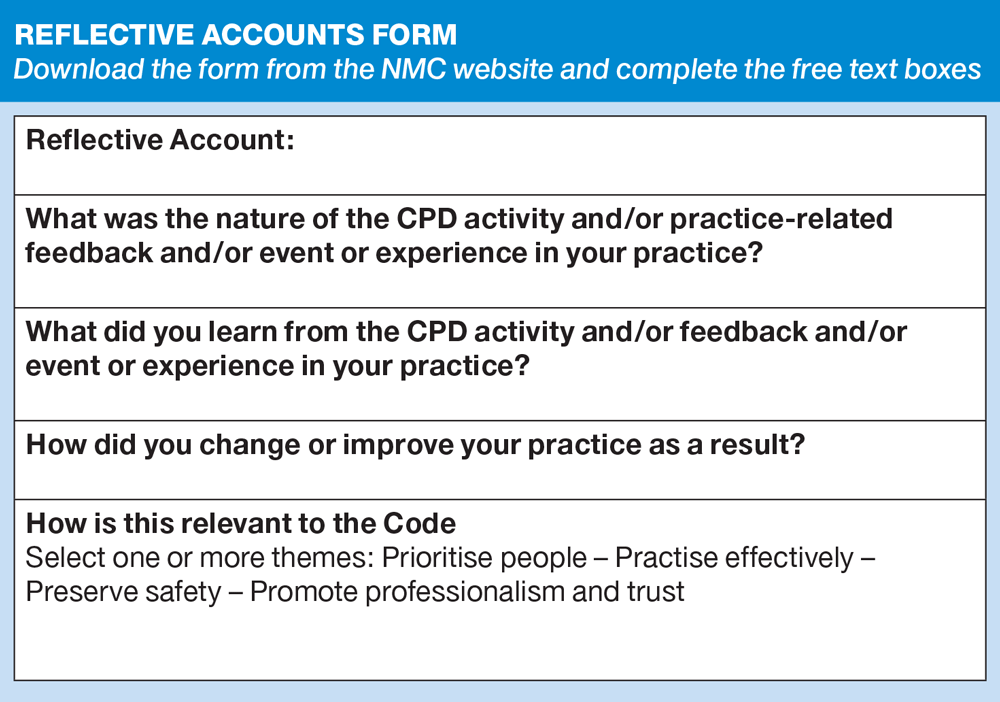Revalidation tips from the NMC
Katerina Kolyva, Director, Continued Practice, Nursing and Midwifery Council
Katerina Kolyva, Director, Continued Practice, Nursing and Midwifery Council
Revalidation for nurses and midwives is well underway, and many of those with revalidation dates in April have already submitted their applications. This underlines the finding from our pilot that nurses and midwives value their own revalidation and want to get the process right
I feel a great sense of pride and anticipation when I write this, because I truly believe that revalidation is a valuable opportunity to empower the hard-working, dedicated and compassionate nursing and midwifery professions to take more accountability for their own practice, engage to a greater level with their patients, colleagues and peers, and demonstrate their continuing professionalism. Over the next three years, the UK’s 685,000 nurses and midwives will all show that they are practising to a high enough standard to renew their registration, and I think this is a very reassuring prospect.
Whether you are revalidating in three months’ or three years’ time, it is worth thinking about how you will approach the process. To help you prepare, I’ve put together my top five tips for getting ‘revalidation ready’.
1. START EARLY
Although you can’t submit your online revalidation application until 60 days before you are due to revalidate, you can start preparing well in advance. During the three years since you last renewed your registration or joined the register, you will need to start building up practice hours and continuing professional development (CPD) time to meet the requirements: 450 hours of practice (or 900 hours if you are a dual registered nurse and midwife) and 35 CPD hours.
Once you have met the revalidation requirements, you will need to discuss them with a confirmer, ideally your line manager. You can have your confirmation discussion any time in the 12 months leading up to your revalidation date, so it is worth identifying an appropriate confirmer as early as possible, to make sure they are aware of what will be required of them. We have published a document on our website called Information for Confirmers,1 which you can direct your confirmer towards if they have any questions.
2. PLAN YOUR CPD ACTIVITIES
In order to revalidate you need to have done 35 hours of CPD, 20 of which must be participatory, over a three-year period. We are often asked which activities count as CPD, and the answer is that this is down to individual judgement. The nurses and midwives on our register work across a huge range of employment settings and scopes of practice, which means that different CPD activities will be appropriate for different people.
You must assess whether a particular activity will enhance your own practice. However, our How to Revalidate document does contain some examples of suitable CPD activities, including learning events, workshops, reading and reviewing publications, and mandatory training.2 The list is not exhaustive, but it will give you an idea of where to start if you’re already thinking about how to meet the CPD requirement.
3. READ EXAMPLE REFLECTIVE ACCOUNTS
One of the new requirements is to write five reflective accounts over the three years since renewing your registration or joining the register. These accounts must refer to:
- An instance of your CPD
- A piece of practice-related feedback you have received
- An event or experience in your own professional practice, and how this relates to the Code
We understand that at first it might seem daunting to have to write reflective accounts in a way that you haven’t been asked to before, which is why we have included example reflective accounts on our dedicated revalidation website.3 Read through these example accounts to get an idea of how you should structure your own, and the kinds of themes you could focus on.
4. RE-READ THE CODE
One of the reasons we are introducing revalidation is to raise awareness of the Code and to give nurses and midwives the opportunity to reflect on the role their professional standards play in their daily practice. We believe that asking each of the 685,000 people on our register to demonstrate on a regular basis that they are ‘living’ the standards in the Code could have a real, positive impact on standards of practice across the UK.
We published a new version of the Code in March 2015, with accompanying guidance on social media, raising concerns, and the duty of candour.4 It’s essential to make sure you are familiar with the standards in the Code before you go through the revalidation process.
5. CREATE AND DEVELOP PEER NETWORKS
Revalidation is all about boosting professionalism, and an essential part of this is regular engagement with other professionals. One of the revalidation requirements is to have a reflective discussion with another nurse or midwife, covering your five written reflective accounts. Our aim is that this requirement will, over time, promote a culture of sharing, reflection and improvement, by encouraging discussion between professionals and helping to ensure that no-one works in isolation.
We know, however, that not all of the nurses and midwives on our register work in a large organisation with teams of fellow professionals to call on. If you are in this position, we would advise that you start building up your own professional networks and/or learning groups in advance of your revalidation date. The nurse or midwife you choose to have your reflective discussion with does not need to be someone you work with on a daily basis or undertake the same type of practice as you, which gives you the freedom to develop diverse and interdisciplinary networks and learning groups.
REFERENCES
1. NMC. Information for confirmers. http://www.nmc.org.uk/globalassets/sitedocuments/revalidation/information-for-confirmers.pdf
2. NMC. How to revalidate http://www.nmc.org.uk/globalassets/sitedocuments/revalidation/how-to-revalidate-booklet.pdf
3. NMC. Revalidation microsite. http://www.nmc.org.uk/globalassets/sitedocuments/revalidation/completed-templates-and-forms-revalidation.pdf
4. NMC. The Code. Professional standards of practice and behaviour for nurses and midwives, 2015 http://www.nmc.org.uk/globalassets/sitedocuments/nmc-publications/revised-new-nmc-code.pdf
Related articles
View all Articles

